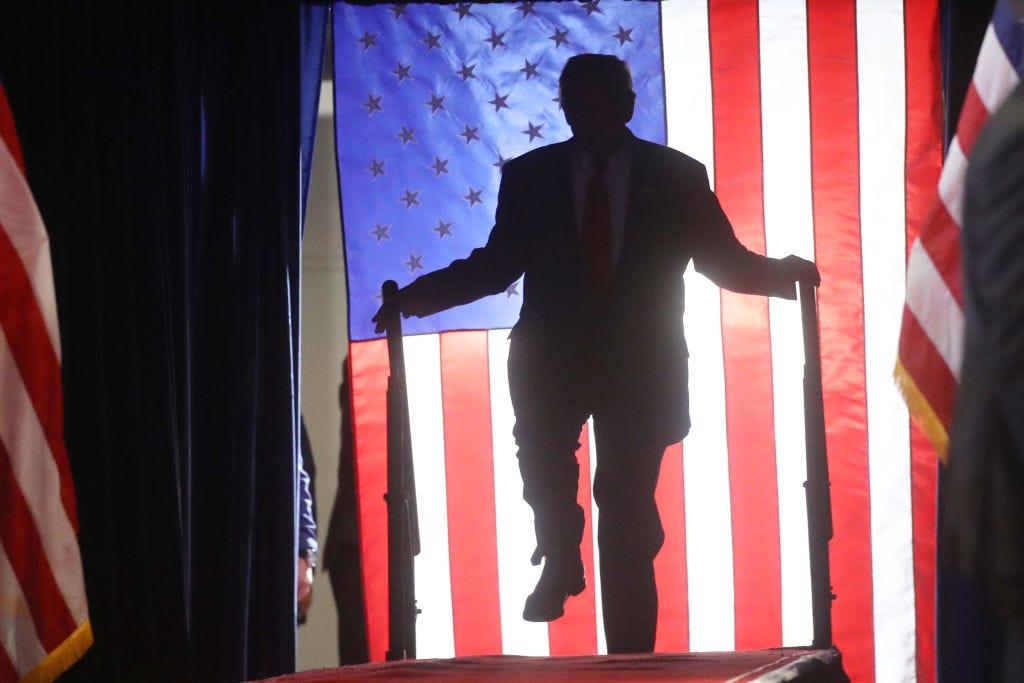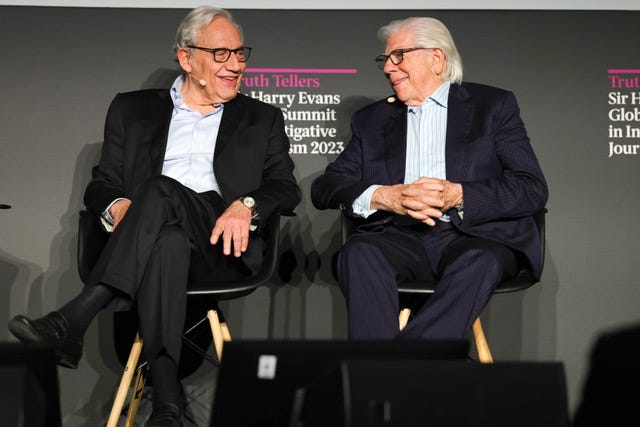Frenzy Barometer
"Trump is only going to get more bizarro —engorged and energized like a gaseous exploding toad.”
I am now so nerve-wracked by the tightening of the race in swing states that even my nocturnal calming mechanism of watching videos of my daughter’s snoring English bulldog does nothing to allay my mounting panic.
It seems so long ago that we thought Biden’s win in 2020 would return America to some form of respect for truth in public life. But the reverse has happened. In the last four years, Trump has taught his party and his followers not just how to lie, but how to lie with abandon. (When Democratic VP pick Tim Walz suggested in an interview with 60 Minutes that his repeated “misspeaking” about being in Hong Kong during the Tiananmen Square massacre does not matter because “folks know who I am,” I wanted to say, Not you too, Tim. It does matter, damn it.)
The non-stop outrage of the journalists and Democrats in response to Trump’s predations has only fed the Trumpian myth that virtue is effete and compassion is for losers. Joy was supposed to be Kamala’s mantra, but when Elon Musk bounded onto the stage at that Trump campaign event in Pennsylvania, he projected a potent brand of joy himself, a reckless relief in fully embracing Trump’s darkness.
In Maureen Dowd’s column last weekend, James Carville vented, “Trump is just taunting us, having a rally at Madison Square Garden just like the Nazis did in 1939.” You can see what he means if you check out this old documentary footage of that 20,000-person German-American Bund assembly he’s referring to. It was billed then as a “pro-America rally” ostensibly held to celebrate George Washington’s birthday and featured a 30-foot banner of the first president framed by swastikas. Holy crap, you could do this in America?! It amplifies the alarm over the increasing Trumpian conflation of patriotism with fascist ideology. With the race now neck-and-neck, Trump is only going to get more bizarro—engorged and energized like a gaseous exploding toad.
Way-Back Machine
I adored the new movie The Apprentice—written by the always news-making journalist Gabriel Sherman. It’s about Trump’s early rise in New York and his mentorship in amorality by the prince of darkness himself, the legal and political fixer Roy Cohn, who loved to brag about getting the Rosenbergs sent to the electric chair. Jeremy Strong’s lozenge-shaped head and upside-down eyes are nothing short of a Cohn metamorphosis. He owns the film from our first glimpse of his alligator presence in the velvet gloom of a fashionable private club staring hypnotically from a table full of mob connections at the young Donald Trump, then a nobody hanging around the bar.
There’s a great New York magazine cover story from the era titled “The Men Who Own New York” (May 1980), featuring the mighty real estate machers Lew Rudin, Harry Helmsley, Seymour Durst, and, standing behind them, the incongruously youthful Donald Trump, who apparently badgered New York’s editor Clay Felker to include him. Not featured on the cover is Sam LeFrak, the 62-year-old master of mass housing who built Queens’ LeFrak City—even though he was the lead protagonist of Nick Pileggi’s accompanying piece. LeFrak, I am told, had arrived at the photo shoot and, seeing “Fred’s kid” in the lineup, demanded, “What’s that vantz (a Yiddish term for a bedbug, or an obnoxious punk) doing here?” Informed that Clay Felker had succumbed to including him, LeFrak barked, “If he’s on the cover then I’m not!” and walked out. His son Richard later became a friend and donor among Trump’s support circle of real-estate billionaires. (And JD Vantz could be the next vice president.)
Truth is not Old
Thank God for Bob Woodward. Fifty years on from All the President’s Men, the 81-year-old still stubbornly believes in pursuing what he and his Watergate partner Carl Bernstein once coined “the best obtainable version of the truth.” I binged on his new book War, about the Biden administration’s tightrope management of the conflicts in Ukraine and the Middle East, which have so closely teetered on going nuclear. When you read the book in one gulp as I did on a red-eye flight, it is so much more than a bristling scoop package.
Because of the speed and superficiality of the news cycle, we know everything and nothing about the people at the heart of our government who do the real work of trying to keep us safe. In scene after scene, Woodward shows us the grueling, daily stress test of public servants trying to keep us out of World War III. (I came to long for Jake Sullivan to get one uninterrupted vacation.) Take Secretary of Defense Lloyd Austin. What did I really know about him before reading Woodward’s book? Just that he was a big, glum Four Star General who’d weathered a press shitstorm about an embarrassingly undeclared interface with prostate surgery. Now, thanks to Woodward, I love the guy. On an October 2022 phone call with Putin’s Secretary of Defense Sergei Shoigu, “a clear Russian apparatchik—hard-ass, dutiful, and subservient,” we learn that Austin, in his “deep baritone voice” tells him bluntly, “We know you are contemplating the use of tactical nuclear weapons in Ukraine” and then lays out the hell that America will unleash if he does. “I don’t take kindly to being threatened,” Shoigu finally responded. “Mr. Minister,” Woodward reports Austin replying without a hint of anger, “I am the leader of the most powerful military in the history of the world. I don’t make threats.” When Austin’s irate French counterpart calls him up with a “22-minute diatribe of American perfidy” about the US nuclear submarine deal moving to Australia, Austin replies, “Acknowledged. Next topic.”
Woodward’s unremitting slog to get the story is almost as arduous as the government workings that have been his life’s obsession. And after 23 books, War is the first one he’s dedicated to his “lifelong friend and reporting partner Carl Bernstein.” In the winter of their lives, the Mick and Keith of American journalism have both become somewhat sentimental about their five decades of intermittently checkered intimacy. They shared epic times. They transformed the face of journalism and made it the profession every young reporter dreams it could be. Those proud days of confident, well-resourced media ownership have mostly collapsed, but their own rigor has not, nor their more than 50-year conversation. They rarely talk less than three times a week, sharing political intel, dissecting the big news story, or chewing through the one they are mystified no reporter is pursuing.
In September of this year, the two octogenarians appeared together at a fundraising dinner in Manhattan I hosted for an investigative journalism foundation founded in honor of my late husband, Sir Harry Evans. Woodward with his silver hair, measured delivery, and noblest-Roman-of-them-all profile, and zesty, eternally curious Carl with his still abundant white coiffe and irreverent white sneakers, ruminated with Fareed Zakaria about the resources required (and given to them by The Washington Post) to do real journalism.
At one moment on stage, Woodward turned to Bernstein and said, “You taught me how to be aggressive,” a comment that surprised many of the guests. Later, I emailed Woodward to ask him to expand on his remark. He replied, “From the beginning, immediately after the June 17, 1972 break-in, Carl said we could never talk to Nixon campaign officials in their offices. We had to go to their homes at night. I had been at the Montgomery County Sentinel and done some night interviews, but not with the intensity that Carl insisted on. I still do that. Night work remains the center of my workday.
“Carl and I have always talked, but we have talked even more regularly during the Trump years in part because Trump echoes Nixon’s behavior and self-focus. It is the frame of reference we share.
“As you know, I conclude Trump is worse and more of a threat than Nixon.”
If Trump wins again, we shall depend more than ever on journalism’s great night workers.








Great start. Thanks for sharing!
Welcome, boss